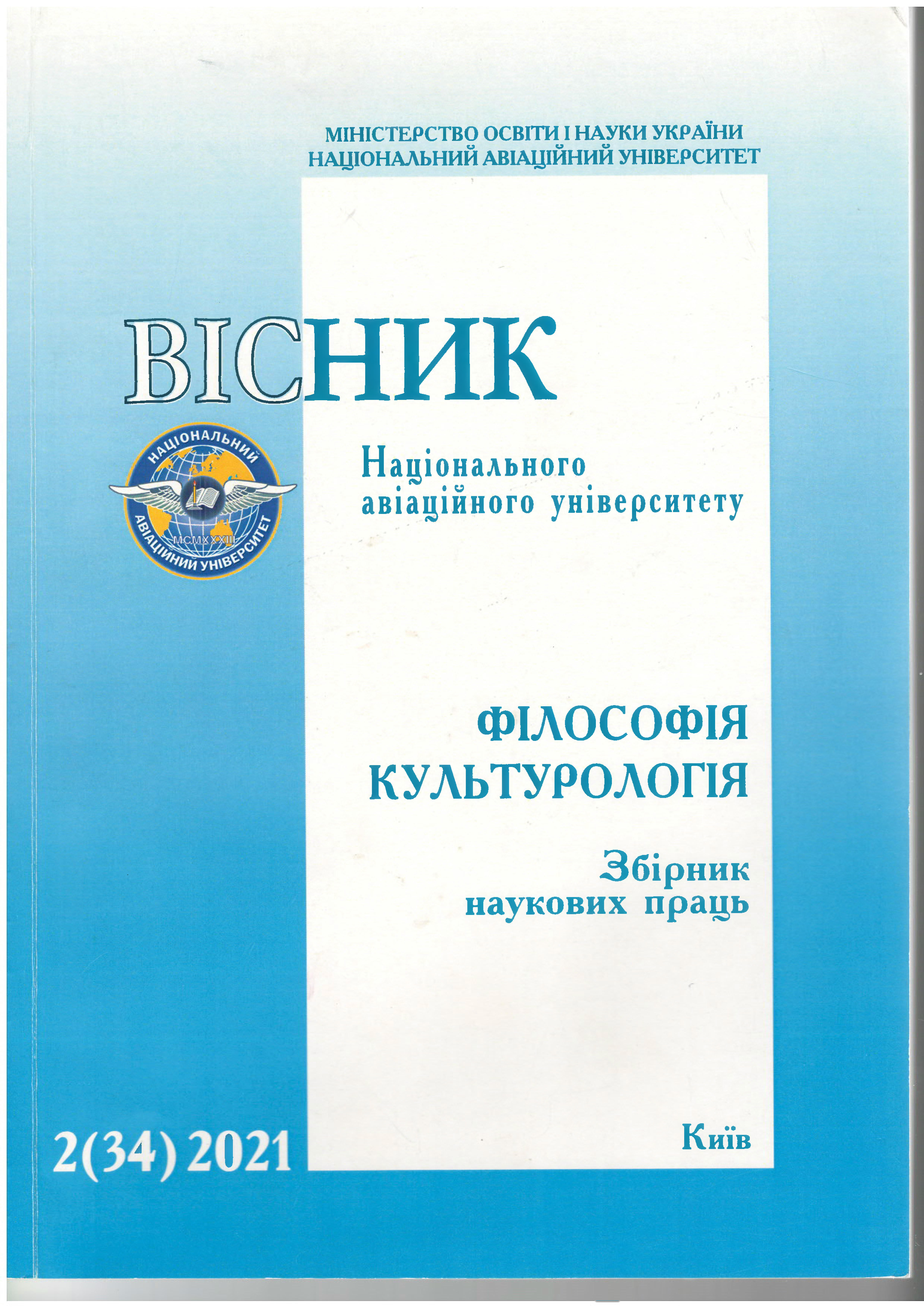SPECIFICITY OF ECOLOGICAL DISCOURSE IN THE XXI CENTURY
DOI:
https://doi.org/10.18372/2412-2157.34.16316Keywords:
ecological discourse, ecopsychology, ecology, discourse, cultural ecologyAbstract
Introduction. Awareness of the link between the environmental state and the accumulation of harmful effects ofhuman activities has led
to the formation of certain social requirements for the political leadership of different countries to take urgent measures to protect the
environment Research methods are a socio-philosophical study of the specifics of ecological discourse in the XXI c. The aim and
tasks are sociocultural, cultural-historical, systemic, and comparative methodological approaches in their dialectical unity. Research
results. Considering that ecological discourse can be viewed from two perspectives as a discourse reducedto issues of ecology as a
science andas a discourse of the environment of man, the author explores ecological discourse in the broad sense of the word as an
ecology of the mind, cognition, action, communication, creativity and more. This perspective gives ecological discourse an
anthropological dimension, and the methodological foundations of new humanitarian (philosophical, sociological, psychological,
pedagogical, educational, etc.) paradigms, including strategies of ecological thinking and environmental ethics, show the importance
ofthe interdisciplinary synthesis of the knowledge at the level of discourse Discussion. From the perspectiveof functional and stylistic
differentiation, the following types of ecological discourse are distinguished: scientific, media, religious-preaching, artistic. Conclusions.
Along withthe formation of ecological discourse, there is the reverse side of the actualization of "ecological". Actualizationof the
ecological is evidence of its scarcity. The solution to the ecological problem is both in the anthropological and socio-cultural dimensions.
References
Список літератури
Бодиан С. Простая по средствам, богатая по
результатам: интервью с Арне Наэссом // Гуманитарный
экологический журнал. – Т. 4. Вып. 2. – 2002.
Ван Дейк Т. А. (1998). К определению дискурса. URL
http://psyberlink.flogiston.ru/internet/bits/vandijk2.htm
Галушко Т. Г. К вопросу об экологическом педаго-
гическом дискурсе // Известия РГПУ им. А. И. Герцена, 2018.
– № 188. – С. 182-189.
Гельпах В. Геопсихічні явища. – Лейпціг, 1911.
Дротянко Л. Г. Идеи ноосферы В. И. Вернадского в
контексте русского космизма и постнеклассической науки //
Екологія довкілля та безпека життєдіяльності. – К.: 2003. – №
– С. 7-12.
Иванова Е. В. Метафорическая концептуализация
природных катастроф в экологическом дискурсе: на
материале медийных текстов: дисс. ... канд. филол. наук.
Челябинск, 2007. – 219 с.
Калёнова О. Г., Дубровская Т. В. К проблеме
определения экологического дискурса и его жанров //
Лингвистика и межкультурная коммуникация. – Выпуск №2
(16), 2015.
Кант И. Сочинения в 6 томах / И. Кант; под общей
редакцией В. Ф. Асмуса. А. В. Гулыги, Т. И. Ойзермана. – М. :
Мысль, 1965. – Т 4. – Ч. 1. – 544 с.
Князева Е. Н. Современный эволюционизм, экологи-
ческая деонтология
Матюхина А. А. Традиции как основа экологической
парадигмы культуры современного общества / А. А.
Матюхина // Вісник Національного авіаційного університету.
Філософія. Культурологія. – 2020. – № 2. – С. 119-123.
Михайлова Е. В. Конститутивные признаки научного
дискурса // Языковая личность: проблемы обозначения и
понимания: тез. докл. науч. конф. Волгоград: Перемена, 1997.
С. 95-96.
Морен Э. Образование в будущем: семь неотложных
задач // Синергетическая парадигма. Синергетика образования.
М., 2006.
Панов В. И. Экопсихология как область психологического
исследования / В. И. Панов. http://ecopsy.com.ua/data /zbirki/
_01/sb01_50.pdf
Саттон М., Андерсон Е. Н. Вступ до культурної екології,
Altamira Press, 2013.
Светлана Семенас Глубинная экология: краткое
введение в теорию и практику / Адукатар № 3. http://adukatar.net/
wp-content/uploads/2009/12/Deep_Ecology_3.pdf.
Сідоркіна О. М. Людина і природа у феномені
робінзонади / О. М. Сідоркіна // Вісник Національного авіаційного
університету. Філософія. Культурологія. – 2020. – № 2. – С. 47-51.
Скиба І. П. Сталий розвиток як соціокультурний розвиток /
І. П. Скиба // Вісник Національного авіаційного університету.
Філософія. Культурологія. - 2020. – № 2. – С. 128-134.
Скиба О. П. Екологічна культура як складова духовності
сучасної людини / О. П. Скиба // Вісник Національного авіаційного
університету. Філософія. Культурологія. – 2021. – № 1. – С. 146-
Фрейк, Чарльз О. «Культурна екологія», американський
антрополог 64.1 (1962): 53–59.
Фуко М. Археологія знання / М. Фуко; пер. з фр.
В. Шовкун. – К. : Вид-во Соломії Павличко «Основи», 2003. –
с.
Эпштейн М. Творческое исчезновение человека.
Введение в гуманологию // Философские науки. 2009. № 2. С.
-105.
Calvet L.-J. Pour une écologie des langues du monde.
Paris, Plon, 1999. – 304 p.
Haugen E. The ecology of language. Stanford University
Press, 1972. – 366 р
Herring, S. C. Computer-Mediated Discourse, in The
Handbook of Discourse Analysis (eds D. Schiffrin, D. Tannen and
H. E. Hamilton), Blackwell Publishers Ltd, Malden, Massachusetts,
– P. 612-634.
Siegfried Jäger. Kritische Diskursanalyse. Eine Einführung. 4
Aufl. Unrast, Münster, 2004. – S. 89.
Steward, J. H. (1955). Theory of culture change: The
methodology of multilinear evolution. Urbana: University of Illinois
Press.


